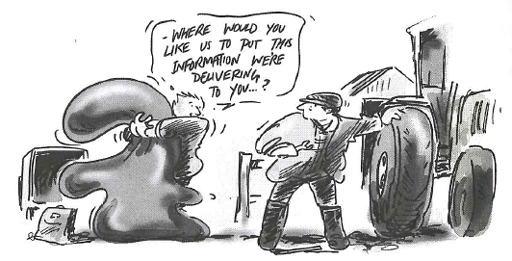2 What are you hoping to learn?
Anticipations and preconceptions are an important determinant of how people learn, so before you read on, you should record some of what you are experiencing now as you begin the course.
It’s important to get these impressions noted down now, because new ideas and new impressions will quickly overlay the experience. What you are experiencing now will be re-interpreted as new understandings emerge. You are also likely to form some judgements about your expectations. So before any of that can happen, you are encouraged to make some notes on your responses to the questions in the activity below. You will need to keep referring back to them as the course progresses.
The notes you make for this and other activities will be important if you truly want to work towards becoming a systems practitioner rather than just someone using a systems tool or technique, so you should do them as conscientiously as possible. Their role in developing your skills will become more evident as you work through the course and will also be useful after you have completed it. Your notes should capture as many elements of your responses as possible. So do please keep a record in a journal – whether a physical notebook or a digital one of some form – as you work through the activities in this course, as they are an important aspect of reflective practice. Alternatively, you might like to record your answers to activities in their associated text boxes.
Activity 1 Why are you studying this course?
Fifteen minutes may seem like a large amount of time to spend on this activity, but thinking about the issues carefully is likely to take that long. Here are prompts to help you:
- What is your purpose in doing this course?
- What do you hope to get from it?
- What benefits do you expect?
- What was it about the course or its descriptions that appealed to you?
- What is it about you that the course appealed to?
- Which specific items appeal to you?
- Which specific items worry or concern you?
How do you rate your overall capacity to succeed in this course?
You first need to decide what, for you, would constitute success.
- Are there other criteria important to you?
- What are they?
- When will success become apparent?
- What would it take to improve your prospects of success, measured by whatever criteria are important to you?
- Can you act to improve your chances of success?
- When you make a judgement about how you rate your capacities, what are you basing it on?
- Are you taking account of external factors such as the time you have or the circumstances in which you study?
- Are you basing your judgement on your own evaluation of your intellectual capacities?
- Do energy, enthusiasm and commitment come into the evaluation?
Comment
Activity 1 is the first of several such activities. It is an example of a pattern of activities that constitute reflective practice or reflective learning. This style of learning is based on the notion that the understandings most useful to us, and that most readily become part of us, are learned by experience. The activities are designed to enable you to discover your own learning by experience. There will be a lot about reflective practice in this course but for now you will be introduced or re-introduced to some basic ideas about it.

